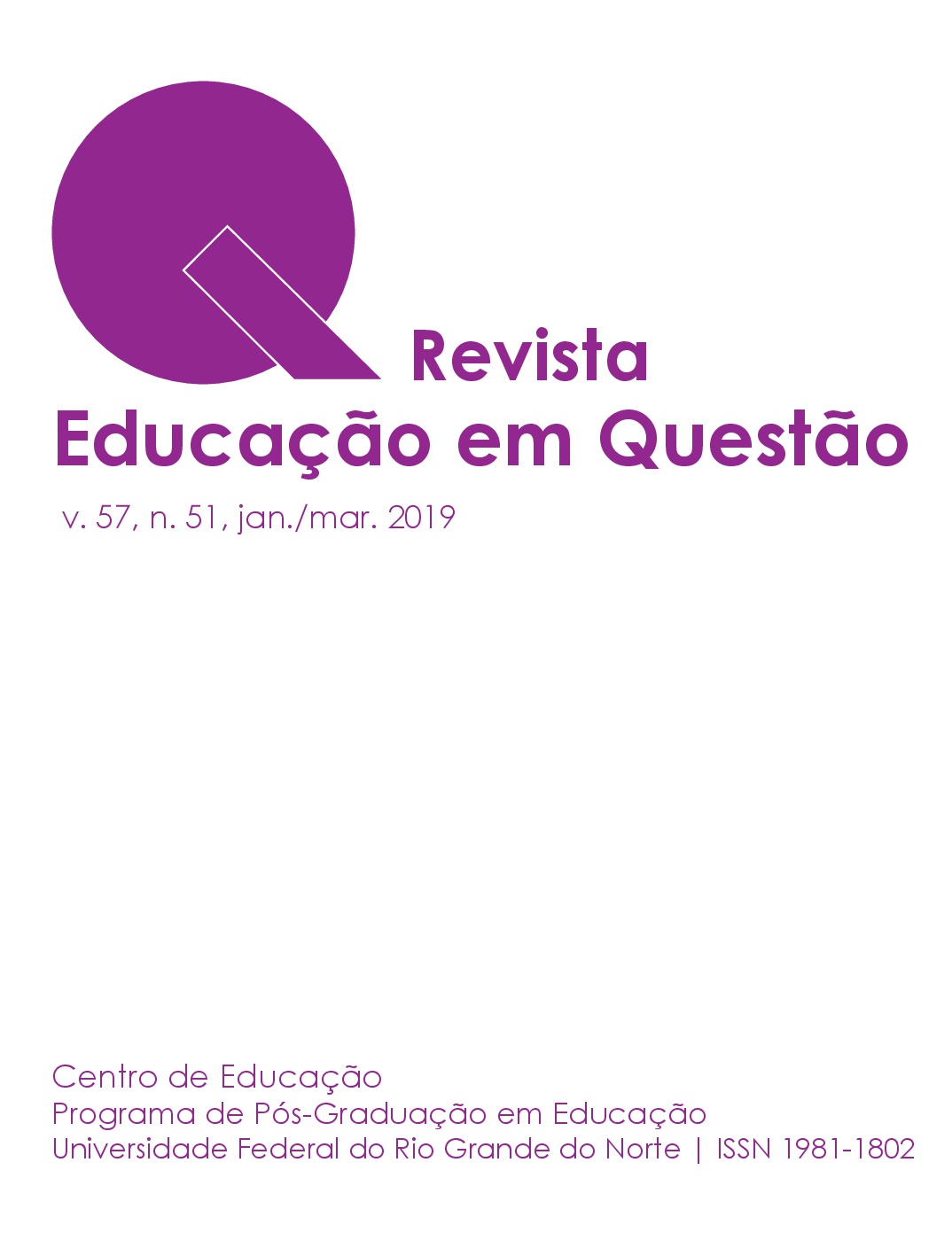O ensino de filosofia nas perspectivas inter e transdisciplinar:
uma análise da problemática ontológica
DOI:
https://doi.org/10.21680/1981-1802.2019v57n51ID15148Palavras-chave:
Ensino de filosofia. Interdisciplinaridade.Transdisciplinaridade.Resumo
Este artigo tem por objetivo analisar as características de um ensino de filosofia, investigado numa pesquisa de mestrado. Buscou-se averiguar o seguinte problema: como um ensino de filosofia, proposto nas perspectivas inter e transdisciplinar, estava sendo organizado numa determinada unidade educacional? Assim, realizou-se uma pesquisa descritiva de natureza qualitativa, tendo por referenciais teóricos Edgar Morin e Basarab Nicolescu. A metodologia foi composta por investigação teórica e incursão a campo. A primeira constituiu-se de pesquisa bibliográfica e análise documental. A segunda consistiu-se em observar a organização do ensino em sala de aula. Além disso, utilizou-se para analisar os dados, a técnica de análise de conteúdo. As questões discutidas nesse artigo referem-se ao conjunto das aulas nas quais foi abordada a problemática ontológica, ou seja, temas, problemas, conceitos relacionados à organização, às percepções e às significações sobre o Real, Realidade ou Natureza. Por fim, a análise das características do ensino investigado não permite considerá-lo um ensino de filosofia inter ou transdisciplinar, mas uma vivência de multidisciplinaridade escolar “modesta”; conquanto mais versátil que o conjunto das aulas sobre os conteúdos epistemológicos, divulgados no primeiro artigo.
Downloads
Referências
BARDIN, Laurence. Análise de conteúdo. Lisboa: Edições 70, 1988.
BRASIL. Orientações Curriculares para o ensino médio. Volume 3: Ciências Humanas e suas Tecnologias. Brasília: MEC/SEB, 2006. Disponível em: <http://portal.mec.gov.br>. Acesso em: 30 mai. 2017.
BRASIL. Ciências Humanas e suas Tecnologias. In: BRASIL. Parâmetros Curriculares Nacionais (Ensino Médio): Orientações Educacionais Complementares aos Parâmetros Curriculares Nacionais. Brasília: MEC, 2002. Disponível em: <http://portal.mec.gov.br>. Acesso em: 30 mai. 2017.
BRASIL. O novo Ensino Médio. In: BRASIL. Parâmetros Curriculares Nacionais (Ensino Médio. Parte I – Bases Legais). Brasília: MEC, 2000. Disponível em: <http://portal.mec.gov.br>. Acesso em: 30 ago. 2017.
BRASIL. Parecer CNE/CEB Nº 15/1998. In: BRASIL. Parâmetros Curriculares Nacionais (Ensino Médio. Parte I – Bases Legais). Brasília: MEC, 2000a. Disponível em: <http://portal.mec.gov.br>. Acesso em: 30 ago. 2017.
BRASIL. Parecer CNE/CEB Nº 7/2010. In: BRASIL. Diretrizes Curriculares Nacionais Gerais da Educação Básica. Brasília: MEC, SEB, DICEI, 2013. Disponível em: <http://portal.mec.gov.br>. Acesso em: 30 ago. 2017.
BRASIL. Resolução Nº 2, de 30 de JANEIRO de 2012. Define Diretrizes Curriculares Nacionais para o Ensino Médio. In: BRASIL. Diretrizes Curriculares Nacionais Gerais da Educação Básica. Brasília: MEC, SEB, DICEI, 2013a. Disponível em: <http://portal.mec.gov.br>. Acesso em: 25 ago. 2017.
COLÓQUIO DE VENEZA. A ciência diante das fronteiras do conhecimento, 1; 1986, Veneza: UNESCO - Fundação Giorgio Cini, 1986. Disponível em: < http://cetrans.com.br/declaracao-de-veneza.pdf> Acesso em: 17 mai. 2018.
CONGRESSO INTERNACIONAL DE LOCARNO: Que universidade para o amanhã? Em busca de uma evolução transdisciplinar da universidade, 1; 1997, Locarno. Anais eletrônicos... Locarno: CIRET-UNESCO, 1997. Disponível em: < http://ciret-transdisciplinarity.org/locarno/locapor4. php>. Acesso em: 15 fev. 2018.
CONGRESSO MUNDIAL DE ARRÁBIDA: Primeiro Congresso Mundial da Transdisciplinaridade, 1; 1994, Arrábida. Anais eletrônicos... Arrábida: CIRET-UNESCO, 1994. (Carta da Transdisciplinaridade). Disponível em: < http://cetrans.com.br/wp-content/uploads/2014/09/carta-da-transdisciplinaridade1.pdf>. Acesso em: 15 fev. 2018.
DESCARTES, René. Discurso do Método. Tradução de Jacó Guinsburg e Bento Prado Júnior. In. Coleção Os Pensadores. São Paulo: Abril Cultural, 1979.
FERREIRA, João H. Lacerda. Real x Realidade. Portal RedePsi. São Paulo, 06 out. 2008. Disponível em: <http://www.redepsi.com.br/2008/10/06/real-x-realidade/> Acesso em: 13/03/2012.
JAPIASSU, Hilton. Interdisciplinaridade e patologia do saber. Rio de Janeiro: Imago, 1976.
MARCONI, Marina de Andrade; LAKATOS, Eva Maria. Fundamentos da metodologia científica. São Paulo: Atlas, 2010.
MARINA, José Antônio. Filosofia e cidadania. 1º ed. Tradução de Ângela dos Santos e Antón Castro Míguez. São Paulo: Ed. SM, 2010.
MINAYO, Maria Cecília de Souza. O desafio do conhecimento: pesquisa qualitativa em saúde. 7. ed. São Paulo: Hucitec, 2000.
MORIN. Edgar. Ciência com consciência. 8º ed. Tradução de Maria D. Alexandre e Maria A. S. Dória. Rio de Janeiro: Bertrand Brasil, 2005.
MORIN. Edgar. Introdução ao Pensamento Complexo. 5º ed. Tradução Dulce Matos. Lisboa: Instituto Piaget, 2008.
MORIN. Edgar. O método 1: a natureza da natureza. 2º ed. Tradução de Ilana Heineberg. Porto Alegre: Sulina, 2008 a.
MORIN. Edgar. O método 3: o conhecimento do conhecimento. 3º ed. Tradução de Juremir Machado da Silva. Porto Alegre: Sulina, 2005 a.
MORIN. Edgar. Os sete saberes necessários à educação do futuro. 2º ed. Tradução de Catarina Eleonora F. da Silva e Jeanne Sawaya. São Paulo: Cortez, 2000.
NICOLESCU, Basarab. O manifesto da Transdisciplinaridade. 3º ed. Tradução de Lucia Pereira de Souza. São Paulo: Triom, 1999.
NICOLESCU, Basarab. O Terceiro Incluído. Da Física Quântica à Ontologia. In: NICOLESCU, Basarab; BADESCU, Horia (Org.). Stéphane Lupasco: o homem e a obra. Tradução de Lucia Pereira de Souza. São Paulo: Triom, 2001.
REALE, Giovanni. História da filosofia antiga (Volume I). Das Origens a Sócrates. Tradução de Marcelo Perine. São Paulo: Loyola, 1993.
SILVA, Gilson Malta da. Diário de Campo: notas de aulas de filosofia - 1º, 2º e 3º anos do Ensino Médio. Colégio Nossa Senhora de Lourdes, Lavras - MG, fev a dez. 2012.
WEIL, Pierre; AMBROSIO, Ubiratan D’; CREMA, Roberto. Rumo à nova transdisciplinaridade: sistemas abertos de conhecimento. São Paulo: Summus, 1993.
Downloads
Publicado
Como Citar
Edição
Seção
Licença
À Revista Educação em Questão ficam reservados os direitos autorais no tocante a todos os artigos nela publicados.
A Revista Educação em Questão reserva-se ao direito de não publicar artigos e resenhas de mesma autoria (ou em co-autoria) em intervalos inferiores há 1 (um) ano.






